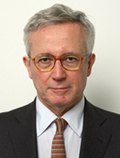| Minister of Economy and Finance | |
|---|---|
| Ministro dell'Economia e delle Finanze | |
 | |
| Ministry of Economy and Finance | |
| Member of | Council of Ministers High Council of Defence Eurogroup |
| Reports to | The prime minister |
| Seat | Palazzo delle Finanze, Rome |
| Appointer | The president |
| Term length | No fixed term |
| Precursor | Minister of Finance Minister of Treasury Minister of Budget |
| Formation | 11 June 2001 |
| First holder | Giulio Tremonti |
| Website | www |
The minister of economy and finance (Italian : ministro dell'economia e delle finanze) is a senior member of the Italian Cabinet who leads the Ministry of Economy and Finance since its creation in 2001 by the fusion of three former ministries, the Ministry of Finance, the Ministry of Treasury and the Ministry of Budget. [1]
Contents
- List of ministers
- Finance, treasury and budget (1946–2001)
- Economy and finance (2001–present)
- Timeline
- See also
- References
- External links
The first minister of economy and finance was Giulio Tremonti, of Forza Italia , while the current office holder is Giancarlo Giorgetti, who has been acting as minister since 22 October 2022. [2]












